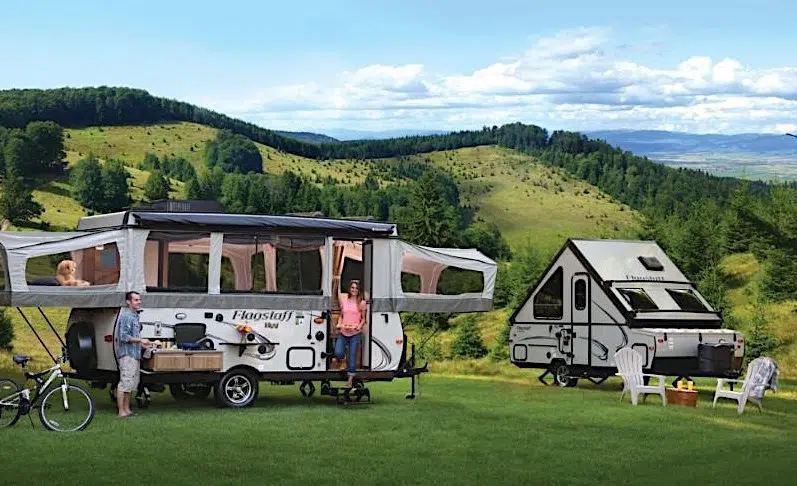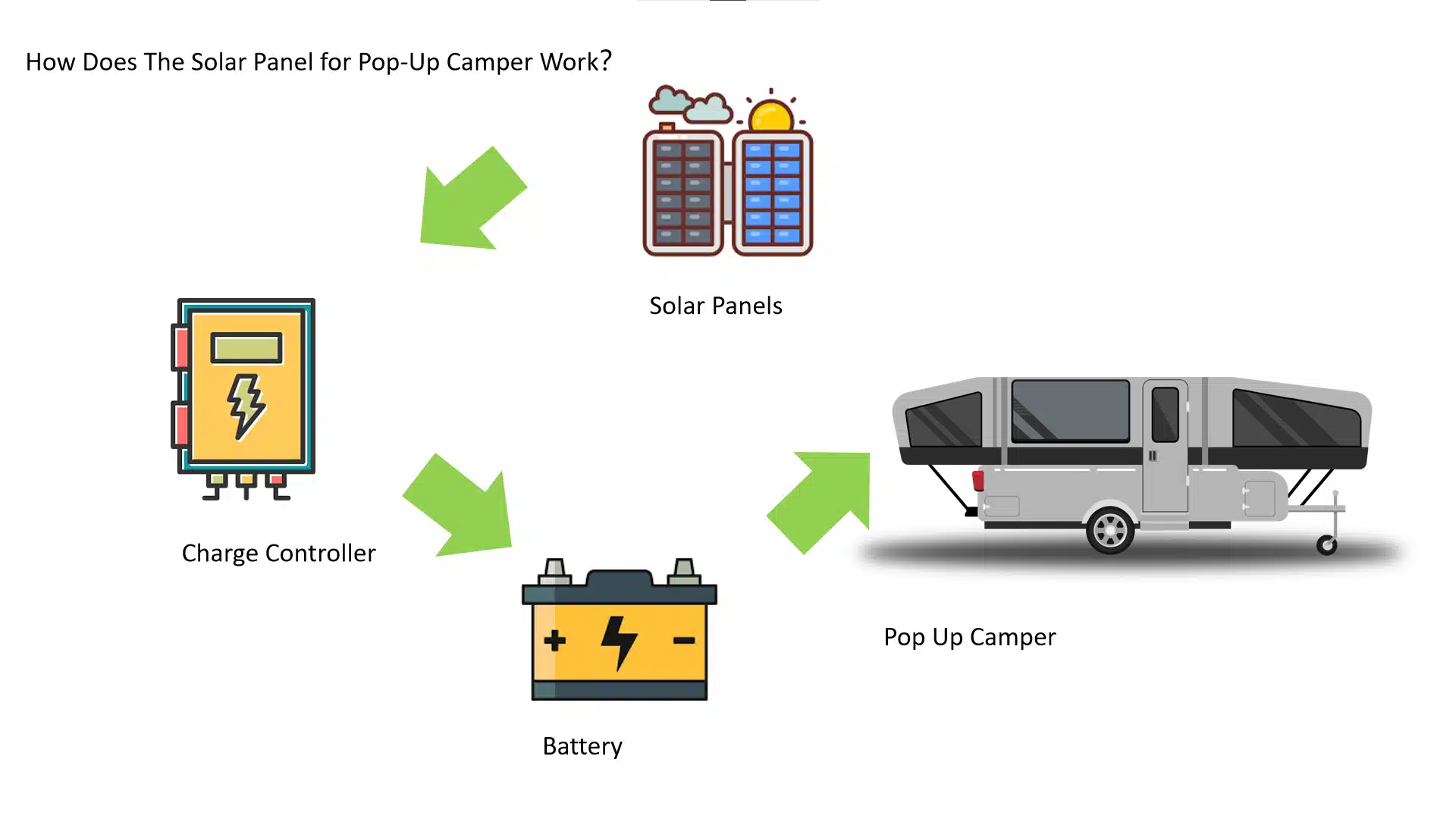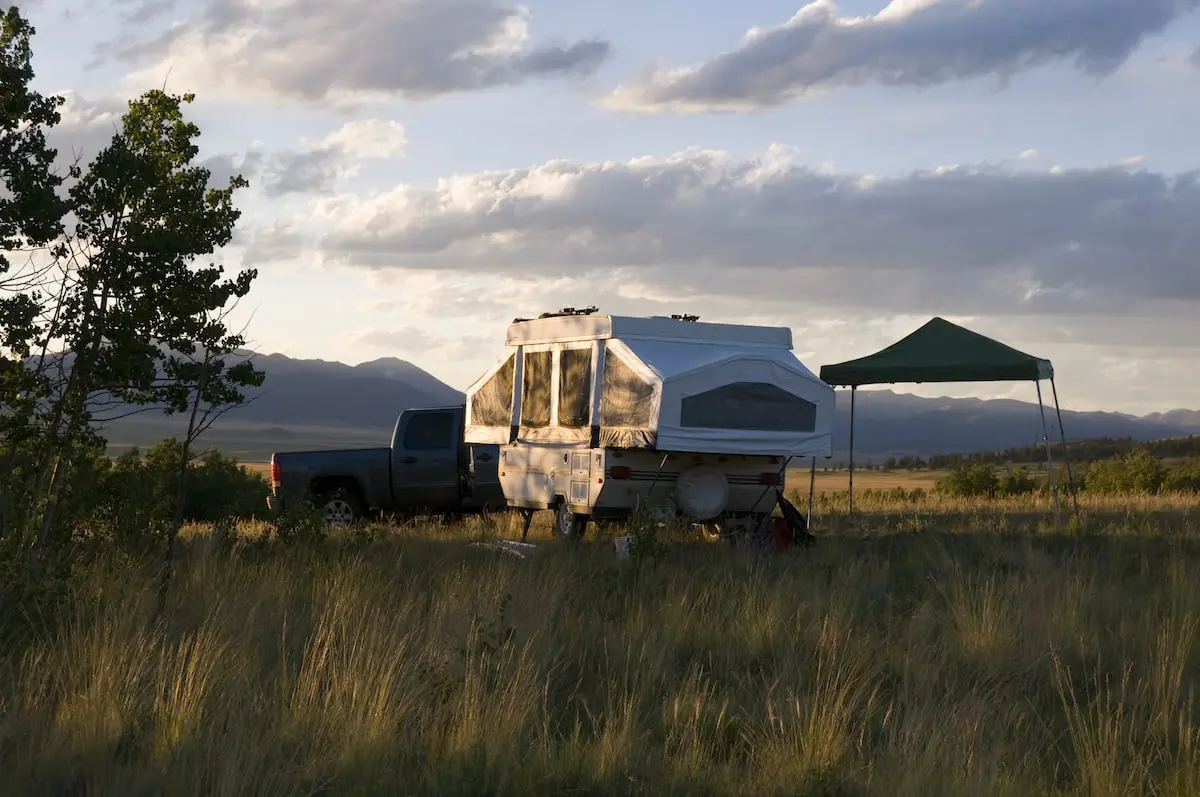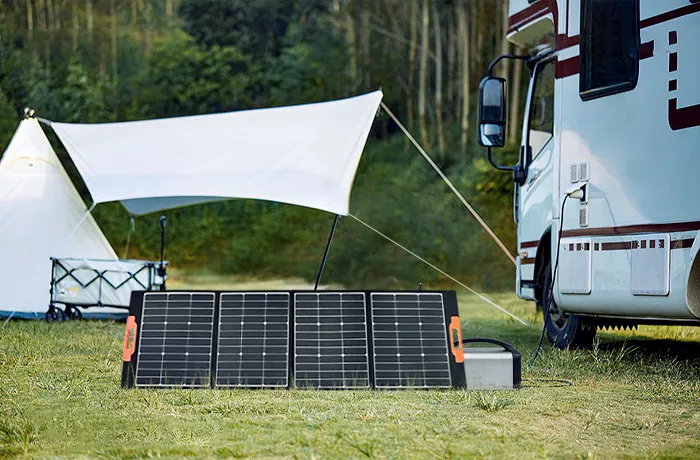Solar panels for pop-up camper are a must if you want to utilize off-grid solar power.
Solar panels are a great way to power your pop-up camper with clean and renewable energy. They can be installed on the top of the camper or moved around to catch the best sunlight. They can convert the sun’s energy into electricity to run appliances like refrigerators, sound systems, or lights.
We’ve written this ultimate guide to help you understand some of the ABCs about solar panels for pop-up campers and to get you started on choosing the best solar panels for your pop-up camper.
What Are Solar Panels for Pop-Up Camper?
Solar panels for pop-up camper are the device that captures sunlight and converts it into electricity to power a variety of appliances and devices inside a camper. It usually consists of solar cells that generate an electrical charge when exposed to sunlight. These solar panels can be mounted on top of the solar powered camper or they can be moved so that they can be flexible in capturing sunlight.
When traveling or parked on the road, solar panels for pop-up camper absorbs sunlight and converts it into direct current (DC). To provide solar power for pop-up camper for electrical appliances inside the vehicle, an inverter is usually installed to convert DC to AC, the type of electricity commonly used for household appliances.
A solar panel pop-up camper provides an energy efficient and environmentally friendly way of generating electricity that can be used for a variety of purposes such as running a refrigerator, sound system, lighting, and charging electronic devices. This setup allows campers to enjoy hours of uninterrupted power, reduces reliance on traditional power sources, and provides greater independence during outdoor off-grid adventures.

How Does The Solar Panel for Pop-Up Camper Work?
The solar panel system for a pop-up camper operates by harnessing energy from the sun through solar panels mounted either on the camper’s roof or as movable units. These panels absorb sunlight, and internal circuits within the solar cells convert this solar energy into electrical current. This current is then regulated by a charge controller, which manages the flow of electricity to the camper’s battery/batteries.
As the solar panels absorb sunlight, they generate DC (direct current) electricity, which is used to charge the camper’s house battery. This stored energy can then be utilized to power various devices and appliances within the camper, or it can be saved for later use. Essentially, the solar panel system enables campers to harness renewable energy to power their camping activities while off the grid.

How Many Watts Does A Pop-Up Camper Use?
On average, a standard pop-up camper may require around 1500-3000 watts of power. However, larger campers with additional appliances like refrigerators and air conditioning units can increase the power usage, potentially reaching 3500 watts or more.
The wattage of a pop-up camper can vary based on several factors such as size, appliances, and their usage. You can calculate the specific watts your pop-up camper needs based on the power consumption of various appliances.
| Appliance | Power Consumption (Watts) Range |
| LED Lights | 5-20 |
| Refrigerator | 50-100 |
| Induction Cooktop | 1000-1500 |
| Air Conditioner | 500-2000+ |
| Microwave | 700-1000 |
| TV | 50-100 |
| Laptop | 30-90 |
| Phone Charger | 5-20 |
| Water Pump | 50-100 |
| Electric Blanket | 50-100 |
| Chargers/Electronics | 5-20 |
How Many Solar Panels Do I Need for My Pop-Up Camper?
Calculate Daily Energy Consumption
Determine your pop-up camper’s average daily energy consumption in watt-hours (Wh) based on the appliances you use.
Select Solar Panel Wattage
Choose the wattage rating for your solar panels. For example, if your camper consumes 500 Wh per day and you opt for 100W solar panels, you would have 5 solar panels (500 Wh / 100W = 5 panels).
Consider Sunlight Hours
Estimate the number of sunlight hours available at your camping location. This will affect how quickly your solar panels can charge your camper’s battery.
Factor in Efficiency and Overcast Days
Account for the efficiency of solar panels and consider additional panels for overcast days. Not all sunlight hours may be optimal for charging.
Adjust for Daily Electricity Consumption
If your camper uses, for example, 196W per day, you may need at least 2 * 100W solar panels or 1 * 200W solar panel to meet your daily electricity needs.
Consider Portable Solar Panels Pop Up Camper
Portable solar panels provide flexibility in positioning to maximize sunlight exposure. They can be moved around more easily than fixed panels attached to the camper

How to Hook up Solar Panels with Pop-Up Camper?
Step #1: Expand and mount your solar panels on the ground of your camper, make sure the panels are secure and face south for optimal sunlight exposure.
Step #2: Run your wiring from the solar panels to the battery compartment of your camper. You may need to use a cable gland. Use the appropriate wire size for your system, and avoid sharp bends or kinks.
Step #3: Connect your charge controller to the battery and the solar panels, following the manufacturer’s instructions. The charge controller regulates the voltage and current from the panels to the battery, preventing overcharging or damage.
Step #4: Install your inverter if you want to use AC appliances in your camper, such as a microwave or a TV. The inverter converts the DC power from the battery to AC power for your devices. You can connect the inverter to the battery directly or through a fuse box.

Sungold Solar Panels for Pop-Up Camper
If you are still troubled by comparing the various pop-up camper solar panels on the market, at this moment, you can put it behind you. Sungold has prepared the 3 best solar panels for pop-up camper for you, providing you with faster options for your outdoor adventures.
The SGF Series 300 watt solar panel consists of two aluminum-framed collapsible solar panels with adjustable T-U aluminum mounts, sturdy latches, and heavy-duty handles, making it a portable, user-friendly solution that’s perfect for the adventurous traveler. They bring solar power for pop-up camper when you are traveling off-grid, which is both convenient and reliable.
FAQs
What size solar panel do I need to run a 12V fridge in my camper?
To power a 12V fridge in a camper running for 12 hours daily (36 AH), you’ll need a 200W solar panel or two 100W panels for efficient use with a 50AH battery.
Can a 100-watt solar panel run a camper?
A 100-watt solar panel can usually cover basic needs like charging cell phones and laptops, but it won’t be enough to cover a lot of the power needs of a camper. If you want to run more appliances, such as a refrigerator, you may need more panels or higher wattage panels.
Is a pop up camper considered an RV?
Yes, a pop-up camper is considered a type of recreational vehicle (RV). It is a collapsible unit that can be towed behind a vehicle, expanding at a campsite to provide more living space and amenities. Pop-up campers offer a blend of mobility and comfort, making them a practical choice for travelers.











